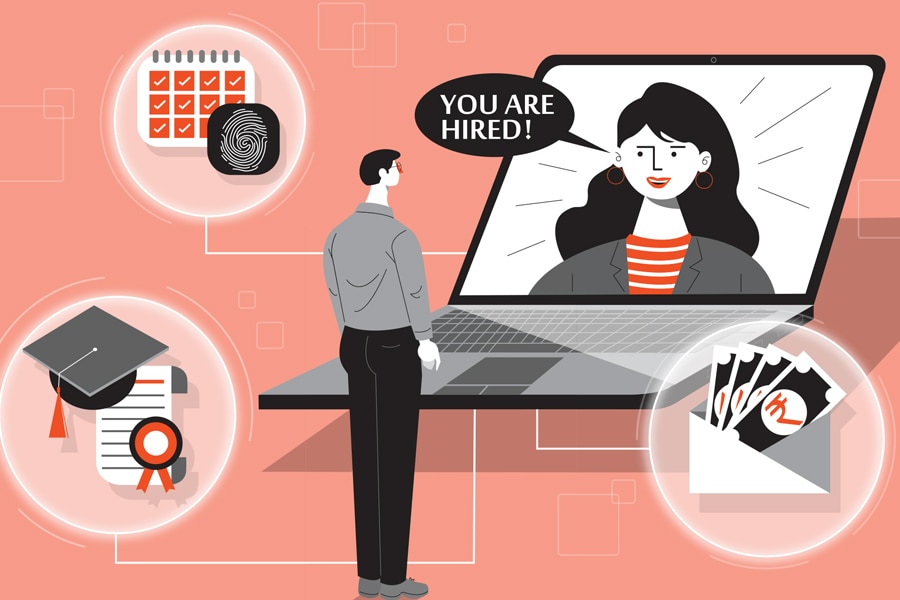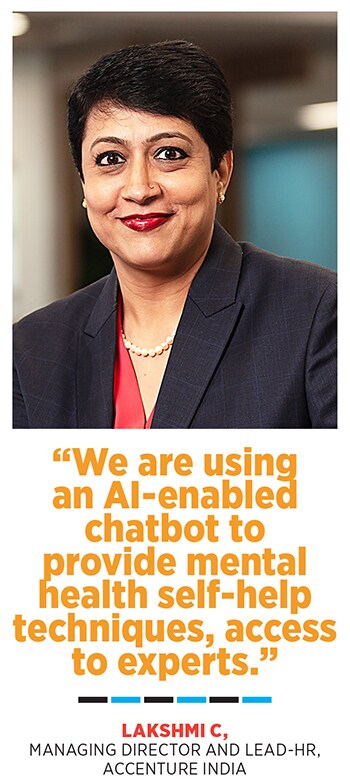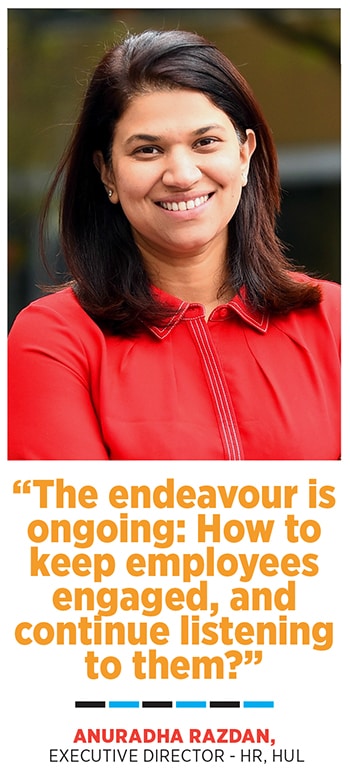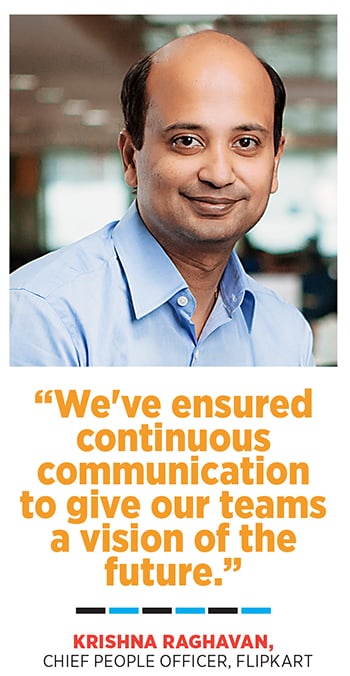Human resources during a pandemic
From digitally connecting with employees to reinventing job roles, the coronavirus outbreak is witnessing an evolution in the way human resources are engaged and managed


 Illustration: Chaitanya Dinesh SurpurAnuradha Razdan knew she would have to think on her feet. It was not business as usual.
Illustration: Chaitanya Dinesh SurpurAnuradha Razdan knew she would have to think on her feet. It was not business as usual.
Days before Prime Minister Narendra Modi announced a nationwide lockdown on March 24 to control the coronavirus, Razdan, executive director of human resources (HR) at FMCG major Hindustan Unilever (HUL), put together a multi-pronged business continuity approach. First, since 70 percent of the company’s revenue comes from the sale of essentials, its 28 factories across the country had to be kept running.
This meant continuous coordination with state governments and local authorities to keep up with changing guidelines, finding alternative sources of labour wherever required, since some employees had returned to their respective hometowns due to the outbreak, arranging for workers" accommodation on factory premises, providing for hygiene and sanitation, dispelling social taboos and misinformation around the virus, issuing early payments to small- and medium-scale suppliers, extending credit to small-scale customers, distributors and partners, and building infrastructure for 18,000 employees to work virtually.
This was just the beginning of a series of measures that would change the way the organisation functions, including how teams are rebuilt and manpower is reassigned across critical business functions, how leaders look after the physical and mental well-being of their employees, and how crucial HR systems—traditionally mandating physical presence and interactions—are digitised. “The endeavour is ongoing: How do we keep the rhythm of the business going? How do we keep employees engaged and productive? How do we continue listening to them to keep the positive momentum going even in the midst of all the disruption and changes we are seeing to our ways of work and lives?” says Razdan.
Covid-19 is accelerating some of the greatest workplace transformations of our time. It is bringing about major shifts in the way people are hired, on-boarded, trained, assessed and promoted. There is a transformation in how companies communicate and connect with their employees, and help them re-skill and up-skill.An April 2020 report by consultancy EY India titled ‘HR resilience planning—Covid-19 impact and preparedness’ indicated that 72 percent of organisations in the country feel that the impact of the coronavirus in business will be felt well beyond six months. About 55 percent of these organisations, the report states, foresee medium to significant impact on employee cost, while others are still unclear. This means corporations and startups will take calls about cutting costs and managing employee compensation.
Steering these transitions is a team of HR professionals. “During the pandemic, we have seen HR, which is usually seen as an enabler or a support function, transform into a business driver,” says Shanthi Naresh, India business leader, Mercer India. She believes that while rolling out any course of action during this time, whether it is supporting employees or handling costs, HR processes must balance economics with empathy.
Tech for teamwork, learning and agility
“Fear is common to all, be it an employee, delivery partner or leader. So we are all forced to explore solutions,” says Aswathy Palakkal, head of HR for Dunzo. While the Google-backed hyperlocal delivery startup has various virtual bonding initiatives (like meetups, discussions, webinars and games) to boost employee morale and well-being, they are also building product innovations to ensure safety of delivery executives.
After procuring permissions from local authorities for people to conduct on-ground deliveries and distributing hygiene kits among delivery personnel, the startup has trained them to make no-contact deliveries. Weekly walk-in interviews for delivery executives at Dunzo"s offices are now replaced by online recruitment, on-boarding and training. Dunzo is also pilot-testing a drone delivery solution as a longer-term project, and has received an approval from the Directorate General of Civil Aviation for it.
The Bengaluru-headquartered startup has about 21,000 delivery executives (recruitments are taking place as per demand) who work for 6 to 8 hours every day. To keep them motivated, tweaks have been introduced on the Dunzo app through which customers can either tip their delivery executives extra or send out messages or gestures of appreciation.
“Apart from rolling out a new insurance policy that covers coronavirus-related expenses, we have constituted an online crowdfunding campaign from which the money raised will be directly sent to delivery partners and their families,” says Palakkal. The campaign to raise `3 crore on online platform Milaap has seen employees and the leadership team contribute between 50 and 75 percent of their salaries.
As HR streamlines the process for working from home, it is also essential to take into account the physical and mental fatigue that employees might experience from professional isolation, says Nitin Jain, managing director of consulting firm Alvarez & Marsal (India). “It is critical that the HR and leadership engage more actively and intently with employees, without any agenda,” he says. “We have chosen a bottom-up engagement, which focuses on the junior-most employees first.”The EY India report, which incorporates inputs from HR heads from more than 100 organisations across sectors, states that apart from virtual methods of recruitment, more than 70 percent companies are experimenting with emerging technologies like artificial intelligence (AI), robotic process automation, and machine learning.
“There has been an incredible amount of focus on cross-functional, horizontal interactions, planning, reviews etc going virtual. Companies are also experimenting with advanced digital tools to monitor productivity, but it is still early days for that,” says Anurag Malik, partner and India workforce advisory leader, people advisory services, EY India. “Monitoring employee productivity online is done mostly through maintaining a disciplined, structured work plan, a clear communication strategy, setting work expectations and reviewing it on a daily or weekly basis. It’s a more cultural thing.”
Krishna Raghavan agrees. The chief people officer of ecommerce giant Flipkart says his organisation is going beyond traditional hierarchies to drive ownership at all levels. “During good times, communicate… and in difficult times, over communicate,” he says. “We have ensured that there is continuous and transparent communication to help our employees get a clear vision of the future. We support them with the right tools they might need to stay productive and, at the same time, inspire them to go the extra mile needed for the tough times.”
Some of the tools Raghavan is referring to include regular webinars on fitness, meditation, self-care, workplace ergonomics, stress and anxiety management. The HR team at the Walmart-owned company has a ‘digital chai break’ concept to help colleagues get together virtually as they work from home, apart from helping employees balance household and child care responsibilities with work, and offering online learning sessions for employees to upskill while working remotely. Flipkart has also on-boarded 150 interns virtually as part of its Flipkart Internship Programme, where work and mentorship sessions are conducted online.
Digital learning has seen a massive upswing among organisations big and small, across sectors, as more employees are open to learning new skills during social isolation. “You can find a way of digitising all HR processes—e-joining, e-exit and everything in between,” says SV Nathan, chief talent officer at Deloitte India. “For example, Covid-19 has set aside the notion that learning and development have to be instructor-led, in classrooms. We are considering doing almost 75 percent of our training and lessons online. These courses could be to do with technology, compliance processes or acquiring soft skills.”
Deloitte India, with a total workforce of 12,000, on-boarded and inducted new employees virtually when the lockdown was first announced. “Going online has saved us a lot of time, and all the boredom that one associates with on-boarding is now gone. You not only get things done before the employee joins, but also make the process more engaging and easy on the joiners,” Nathan says.
Digitising Care
A recent global workforce research study, called "Human Resilience: What your people need to know", undertaken by IT giant Accenture indicates that while companies are reseting their short- and long-term goals virtually in the wake of the pandemic, the need is to support employees in three basic areas: Physical, mental and relational—each focussed on fostering security, resilience, and a feeling of connection and belonging. “Tell a story. Don’t spew data,” was one of the practical recommendations for leaders to follow while hand-holding employees through this time. “Many companies are data rich and can provide people with metrics and predictions. But what people want as human beings is the larger story, the insights. People are wired to find meaning and respond best to stories and analogies during times of great stress and ambiguity,” the study states. Lakshmi C, managing director and lead-HR, Accenture in India, tells Forbes India that working on these lines, their focus is to first enable employees to adapt and thrive in a disrupted work environment. For this, the organisation is using digital tools like a 24x7 employee assistance helpline, online training sessions, virtual summer camps to keep children (between ages 5 and 12) of parents working from home occupied. “We are also expanding the use of an AI-enabled chatbot to provide mental health self-help techniques and access to mental wellness experts,” she says.
Lakshmi C, managing director and lead-HR, Accenture in India, tells Forbes India that working on these lines, their focus is to first enable employees to adapt and thrive in a disrupted work environment. For this, the organisation is using digital tools like a 24x7 employee assistance helpline, online training sessions, virtual summer camps to keep children (between ages 5 and 12) of parents working from home occupied. “We are also expanding the use of an AI-enabled chatbot to provide mental health self-help techniques and access to mental wellness experts,” she says.
Shanthi of Mercer India says she has seen very few companies take a short-term approach of laying off employees, and are containing costs by other measures like hiring freezes and the leadership taking salary cuts. “There could also be industry-wide initiatives for resource-sharing between organisations. Companies in the US have already adopted this model,” she says.
Companies like Zomato and Flipkart have a few such measures in place. At Zomato, employees were requested to take up a voluntary pay cut, and 75 percent opted for it, according to Daminee Sawhney, vice president-HR, Zomato. “The world has come to a halt and unfortunately, the restaurant industry is one of the worst-hit. We made quick changes to enable business continuity, keeping in mind the need of the hour,” she says. This included cross-utilising bandwidth across teams. “We identified teams where business was slow due to the current situation and realigned them to businesses or teams that were seeing more action, such as grocery or Zomato Feeding India [an online fundraising campaign to provide grocery kits to daily wage earners],” Sawhney explains.
Flipkart, on the other hand, has forged partnerships with companies like Uber, Spencer’s and Tata Consumer Products to ensure essentials are made available to consumers. “We have also introduced Covid-19-focussed health insurance plans in partnership with ICICI Lombard and Digit,” says Raghavan.
Conglomerates like HUL have made larger social commitments. The FMCG giant, for instance, is committing `100 crore toward vulnerable communities with initiatives that include distributing soaps, sanitisers, hand wash, disinfectants, launching a food relief programme, helping the government with awareness campaigns, and upgrading testing facilities in health care centres. “Business continuity and social commitments go hand-in-hand,” says Razdan.
Changes beyond Covid-19
All HR leaders Forbes India spoke with agree that Covid-19 will leave long-lasting or permanent impacts on business functions. “The pandemic has made us realise that there are roles in which people can permanently work from home, saving them time and us resources. With corporate travel, we can re-evaluate if a physical meeting is even necessary or if it can be done online,” says Sudhir Dhar, executive director, HR and admin, Motilal Oswal Financial Services Limited.
According to Nathan of Deloitte India, Covid-19 has heralded a larger cultural shift that will give more agency to young, millennial workers, who, in the absence of traditional supervision, will collaborate and communicate more effectively. “This will engender trust, and lead to greater engagement,” he says, adding that companies will get more inclusive, diverse and sensitive. “Because organisations are more flexible about how roles are executed, women, who earlier felt they had to stop working when they got married or had a child, will feel more empowered.”
Palakkal of Dunzo believes that while every HR leader spoke about having a people’s mindset, they only realised what it was once Covid-19 hit. She says: “Now, suddenly, conversations are a lot more connected, emotional. We are able to work together, understand and empathise more while trying to chase business goals. This has to be our biggest win.”
First Published: May 12, 2020, 15:46
Subscribe Now
